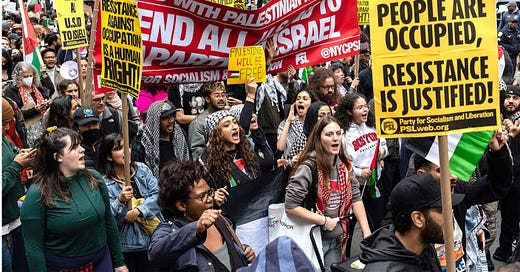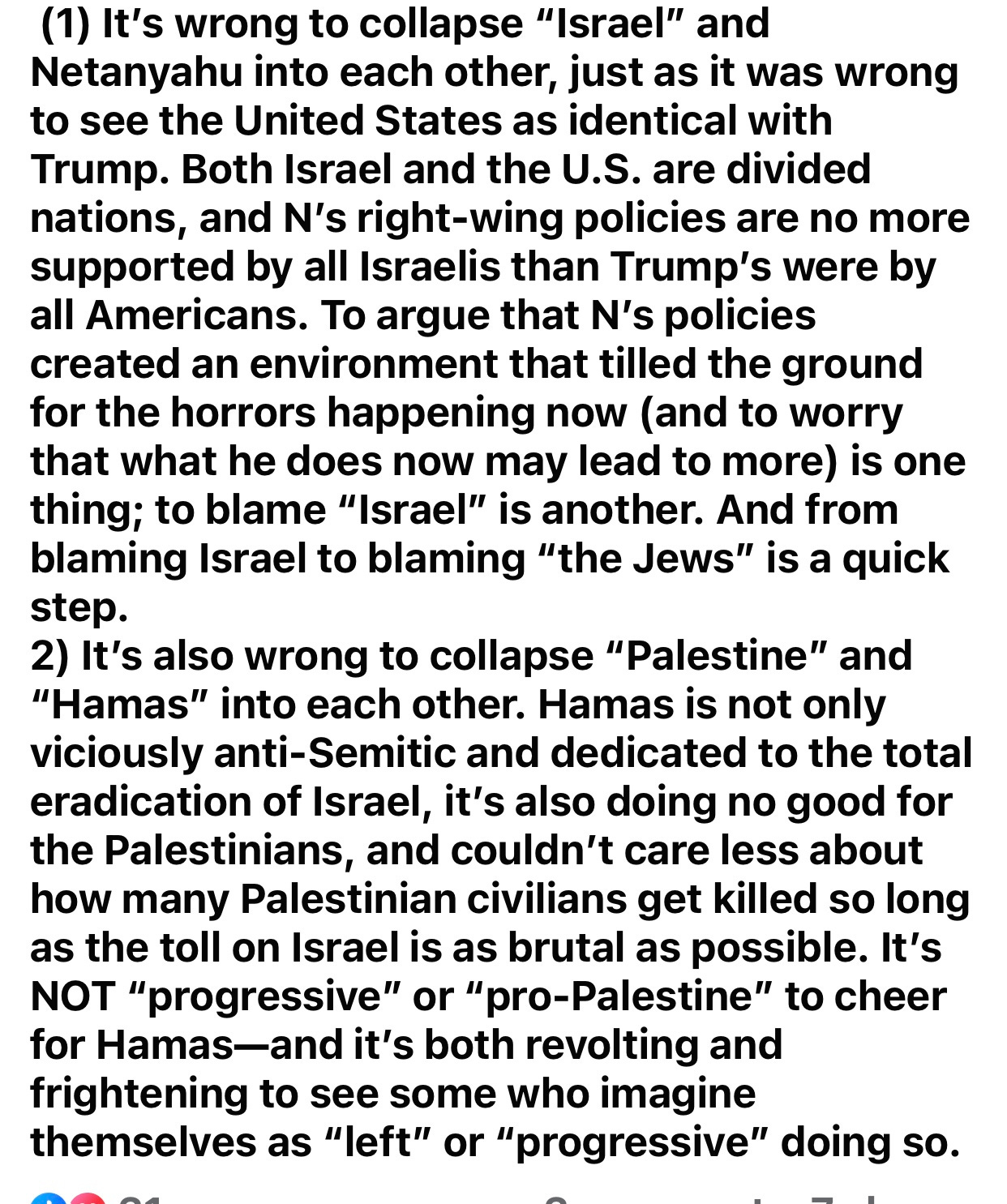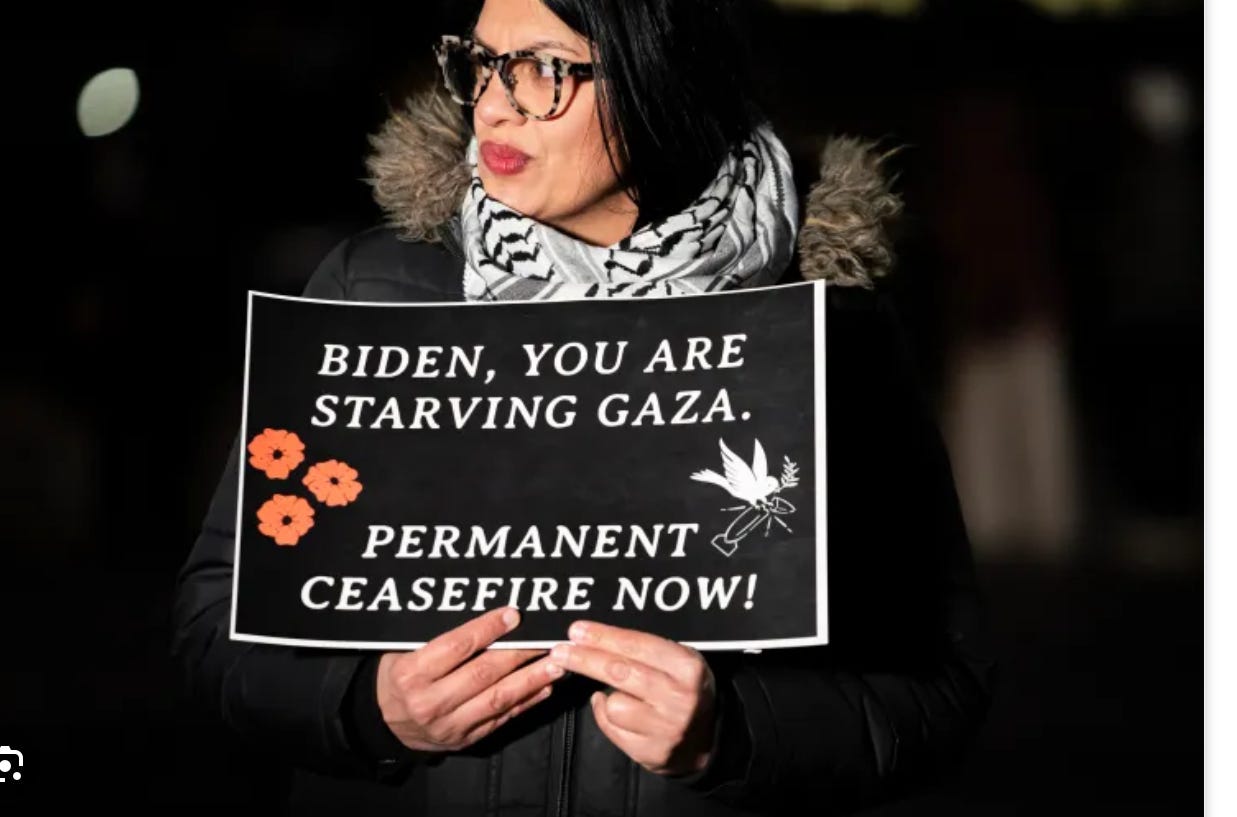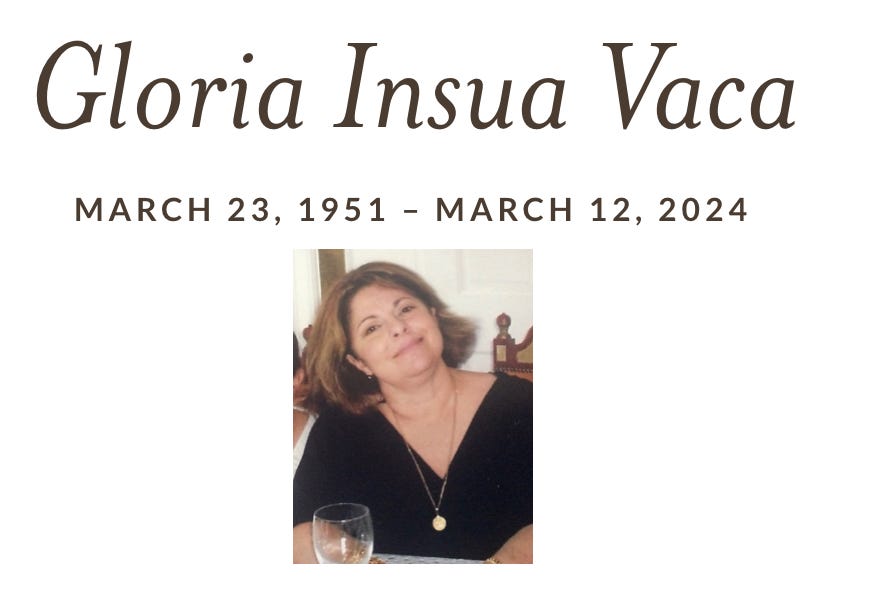The Rhetorical Escalator
How it came to be ok to compare Israelis to Nazis
This stack is dedicated to the memory of Gloria Insua Vaca, whose humanity, humor, and friendship are so very missed by so many.
Like most of you, I’m not a scholar of Middle-Eastern history or politics. I’m a critic of “discourse”: a word made popular by French Philosopher Michel Foucault that really only means the words, images, and narratives circulating in culture. For me, “discourse” includes everything from the language and imagery of advertisements to MSNBC news coverage. I like to take apart what enters our everyday lives (“deconstruct”—another fancy academic word that’s entered popular “discourse”), expose the assumptions on which they are built, excavate the biases they house (often invisibly, which is why people like me actually do have work to do), explore how they are shaping our perceptions and thinking.
Apparently, though, I’m not allowed to do my work when it comes to the Israel/Hamas war. Not unless I want to be accused of supporting genocide and ignoring murdered children.
Just a few examples:
After The New York Times and MSNBC (and every other mass media outlet) misreported the bombing of the al-Ahli hospital, I published a stack about the imbalances of news coverage (coverage that significantly inflamed growing divisions around the world, and that the New York Times was forced to retract.)1 Yesterday, I was told by a latecomer responding to the piece that “you should try to break free of your own Jewishness that obfuscates your ability to think critically.”
I explained, more politely than was called for, that the piece was about media coverage (I had in fact said in a postscript to the piece that I was opposed to Israel’s military actions2) and I objected to his comment about divesting myself of my “Jewishness” as “rude at best” and “antisemitic at worst.” Immediately, he accused me of “Islamophobia” and being cut from “the same cloth as Netanyahu and Smotrich.”
When I posted a note about a particularly anti-Semitic stack and questioned why there wasn’t any “progressive” protest against it, I was pelted with: “Have you rebuked Israel for killing innocent kids? Do you object to Israel killing non-combatants?” And “Are you at all concerned about the mass slaughter by Israel since the Hamas attack?”
This rhetorical move can be likened to a child’s “Oh yeah? So what about you?” Nowadays, though, it’s all over social media, as those, sure of their own moral high ground, applaud each other for exposing the callousness of what they assume (often unjustifiably) is a “pro-Israel” position on the war. I very rarely comment on the war itself. Virtually everything I’ve written has been—to put it simply—about the way we talk about the war, particularly the way the mainstream media reports on the war. There’s a lot to be criticized there. Apparently, though, concerns about the imbalances and distortions of discourse about the war—which I believe have inflamed and divided people who otherwise could be working together toward peace—just show I’m in league with baby-killers.
It’s a pretty horrible time to be Jewish. Jewish performers have had to cancel concerts out of concern for security. The possible casting of Jewish-British actor Aaron Taylor-Johnson has led to the hashtag #BoycottJamesBond trending on X. Posters threatened that they would no longer watch the franchise if a Jewish actor was cast in the lead role. One addressed the producer: “A very bad moment with Israel committing genocide in Gaza. You should be ashamed of yourself I hope your company collapses. ” Another wrote on Instagram: “Boycott Bond, Free Palestine.” And another said: “I will not buy tickets to any of your films. Going to boycott all this Bunch of Killers ”
In one post, I stopped being a media critic for a bit to tentatively open a conversation about it:
“No one, it seems, wants to hear about how we are feeling. Not our “position” on the war, but how it feels to be Jewish now. I try to speak of it and immediately I’m “refuted” with information about Gaza, challenged with words like “genocide” and “ethnic cleansing” and “colonizer.” Only other Jews—and often not even they—understand.”
Whoops, Jews not permitted to have feelings! One response:
You think Nazis, specially those working the camps felt misunderstood and lonely too in 1940?, you think at night they thought: “no one understands us”… honest question, because bombing hospitals, slaughtering children and stealing and poisoning land is not something to brag about in any CV. What part of starving to death hundreds of thousands should we understand?.
The response was accompanied by a photo of an emaciated, dead body.
These are pretty recent and especially repellent examples. But they haven’t come suddenly from nowhere and out of nothing. October 7th was singularly ghastly. But the horror of it was continually undercut by media skepticism over Israeli reports, at the same time as any words and images coming out of Hamas-run agencies and spokespeople were accepted unquestioningly. Some of the imbalance was the result of the image-dominated nature of journalism today. Within days, the narrative shifted from “unverified” October 7 “reports” to the indisputable evidence of photographs—posted virtually every day—of the mounting death and destruction in Gaza. Since it was not Israel’s policy to release visuals that would be upsetting to families of victims, it was easy for those so inclined to doubt Israeli descriptions of the horrors of October 7th.
But the narrative didn’t create itself. Why was the mainstream media so inclined to doubt Israel about October 7? And why were they so resistant to Israeli insistence that it was not one of their bombs that hit that hospital? And, perhaps most disturbing to me, why, in their headlines, did the word “Hamas” disappear, to be replaced by “Palestine”—much as the terrorists themselves scurried back into their tunnels, while innocent Palestinians bore the brunt. The near-constant suspicion of Israeli reports of rape and torture, exacerbated by the media’s “moving on” from condemnation of Hamas and the terrorist attack that started the war to daily reports of a “Israeli/Palestine” conflict in which Israel appeared as a heartless aggressor gave me a cold chill.
Every day brought fresh examples of what Nicolle Wallace called the “asymmetrical skepticism” of reporters and journalists. And although I questioned both the morality and the effectiveness of Netanyhu’s military strategy, I worried about the discursive collapsing of his policies with “Israel” as a nation. Early on, just a few days after October 7, I posted on Facebook:
And then, from very early on, there was the blame-shifting rhetoric of the “left.” A lot of young people who got in on the protests against the war later on may not be aware of how Hamas’ October 7th attack was excused (at best, and too often, celebrated) as “resistance” by brave “freedom fighters.”
This discourse—which understandably was horrifying, even to Jews (such as myself) who had been vocally critical of Netanyahu’s policies—placed us in an untenable situation. How could I possibly join arms with a movement that proclaimed the rapes, torture, and murders of October 7th as “justified resistance”? I didn’t even feel capable of directly addressing the situation. In a substack piece—my first to touch on the war— I wrote:
I’ve been posting brief notes, on Facebook and Substack, since last week-end’s attack. Most of them are about what I often write about: the problems with the way we talk about and represent things. The words, images, narratives that somehow become culturally embedded—in history books, in the mainstream media, in academic discourse, in casual chatter among friends and relatives—have enormous power to lock our minds and perceptions in place. And thinking back on my books and articles, much of what I’ve done is to try to dislodge the blocks of thinking that seem unfair, untrue, or destructive….
I always care very much about what I write, whether it’s a movie or a political outrage. But sometimes, I care too much to write. Sometimes, my fear and anger and frustration is so overwhelming that I can’t manage to harness my thoughts and feelings into the kind of writing I usually do without falling into incoherence. The most I can manage are brief sputters of notes and posts. And the anger and fear bristle and burn inside me, more helplessly because I can’t put them into writing.3
I wish that at that time I had discovered this astute and prescient (It was published October 13) piece by David Faris:
It [SB: the inflammatory discourse excusing Hamas] doesn’t come just from online Redditors, Instagram influencers, or Twitter leftists like British journalist Rivkah Brown, who wrote (and later deleted), “Today should be a day of celebration for supporters of democracy and human rights worldwide, as Gazans break out of their open-air prison and Hamas fighters cross into their colonizers’ territory.” New York’s Democratic Socialists initially supported a Manhattan rally at which protesters appeared to endorse the attacks as justified resistance. “The apartheid regime is the only one to blame. Israeli violence has structured every aspect of Palestinian existence for 75 years,” wrote a groupof Harvard undergraduates in a statement endorsed by 33 student groups on campus. Student groups at other schools have used a silhouetted image of a paraglider—one of the methods the Hamas murderers used to breach the wall between Gaza and Israel—on posters supporting Palestinian resistance. In a piece published Wednesday in New York magazine, Eric Levitz recounted similar expressions of support for Hamas from supposed left-wing individuals and groups.
These are relatively isolated incidents, but this rhetoric tracks with a problematic interpretation of the Israeli-Palestinian conflict that casts all Israelis—not just those living in the occupied West Bank—as colonizers. Ironically, this kind of rhetoric plays directly into the hands of Israeli Prime Minister Benjamin Netanyahu and others on the far right who have long claimed, erroneously, that to the Palestinians, all Israelis are settlers.
As the numbers of Palestinian dead climbed, “genocidal” was added to “colonizers”, as protestors failed to note that numbers of dead, nomatter how horrific, do not constitute “genocide,” the defining feature of which is the (most often, racially or ethnically motivated) intent to eliminate a population of people. That’s Hamas—it’s their stated objective—and some among the Israeli Right Wing think that way too. But even the United Nations, notoriously hostile to Israel, wouldn’t condemn Israel as “genocidal.”
Perhaps the term wouldn’t be flung around so loosely today if the mainstream media had given some air time to the statements of Hamas spokespeople like Ghazi Hamad:
“The Al-Aqsa Flood (Hamas’ code name for 10/7) is just the first time, and there will be a second, a third, a fourth, because we have the determination, the resolve, and the capabilities to fight….
[The interviewer asks: “Does that mean the annihilation of Israel?” And Hamad responds:]
“Yes, of course. The existence of Israel is illogical. The existence of Israel is what causes all that pain, blood, and tears. It is Israel, not us. We are the victims of the occupation. Period. Therefore, nobody should blame us for the things we do. On October 7, October 10, October 1,000,000 — everything we do is justified.”4
You don’t have to be a defender of Netanyahu to see the perversity of Stanford students holding a “Sit-In to Stop Genocide” (even before Israeli troops had crossed into Gaza) while celebrating October 7 as an “act of resistance.” But students were only following their elders. More from David Faris’s excellent piece:
Since the shocking, unprecedented, and ongoing incursions into Israel by Hamas militants on Saturday, the media and social media discourse about culpability has been maddening. Through the fog of war, Americans (and beyond) of every stripe have been roped into expressing support for “sides” of a conflict that many do not understand. This war is complex, and its layers of pain have been formed over many years, battles, and untold deaths. So, perhaps some recent statements, especially from students, have just been ill-conceived. But that hasn’t made the loud, if small, minority who has chosen a reflexive and counterproductive display of support—sometimes, but not always, accompanied with a caveat—for the execrable Hamas any less painful or abhorrent.
Among that (no longer so small) minority are those who have written letters warning President Biden that their vote depends on his withdrawing support from Israel, thus risking the election of the truly Islamophobic Donald Trump. Hamza El Boudali, a leader of the “stop Israeli genocide” movement at Stanford, is so fervent in his Biden-blaming, that he would like to see Biden killed:
“I’m not calling for a civilian to do it, but I think a military should,” the 23-year-old Stanford University student told a small group of protesters last month. “I’d be happy if Biden was dead.” He thinks that Stanford is complicit in what he calls the genocide of Palestinians, and that Biden is not only complicit but responsible for it. “I’m not calling for a vigilante to do it,” he later clarified, “but I’m saying he is guilty of mass murder and should be treated in the same way that a terrorist with darker skin would be (and we all know terrorists with dark skin are typically bombed and drone striked by American planes).” El Boudali has also said that he believes that Hamas’s October 7 attack was a justifiable act of resistance, and that he would actually prefer Hamas rule America in place of its current government (though he clarified later that he “doesn’t mean Hamas is perfect”). When you ask him what his cause is, he answers: “Peace.”
El Boudali may be dismissed as an extremist, but the attribution of genocidal intent to Biden is encouraged by “progressive” leaders.
This is the context in which Jonathan Glazer’s comments at the Oscars, drawing a line, if not a direct comparison, from the behavior and mentality of the Nazi family depicted in his (excellent) film, “The Zone of Interest” to the Israeli “occupation” of Palestine were so disturbing to many Jews.
The mentality depicted in the film—which can rightly be called “dehumanizing” (a word that, like “genocide,” has been tossed around way too lightly)—sees Jews not as human beings but as vermin to be exterminated as efficiently and thoroughly as possible. In one scene, Hoss and others calmly discuss the blueprints for a new kind of crematorium that will serve as a conveyer-belt for the mass incineration and disposal of Jewish bodies. In another, Hoss’s wife and servants pick through the clothing seized when the original owners arrived at the camps and were stripped.
I want this war to end. If the rhetoric of protest against the war was not so entangled with Hamas-excusing, Israel-hating, and Biden-blaming, I’d be happy to march alongside those calling for peace. But Nazi/Israeli comparisons and charges of “genocide” are repellent—and historical distortions. The Nazi’s did not regard Jews as adversaries in a war, but pollutants. For them, killing Jews was no different from disinfecting a house of cockroaches. To compare any of this to Israel’s attitudes toward Palestinians is grotesque. But when a spokesperson for the movie, appearing on MSNBC, made the comparison between the “moral message of the movie” and contemporary protests against Israel, Ayman Mohyeldin thanked him. Glazer’s comments, a few days later, raised controversy, but for far too many, solidified their construction of Israel’s actions as “genocidal.”
The term has stuck in no small part because it’s such a potent, unequivocal charge of condemnation. It allows for no complexities of analysis, no mixed empathy, it gives the one who uses it an unquestionable moral high-ground.
It’s also toxic. I don’t use that term casually. Our ability to understand what is being said, to appreciate each other’s experiences, to think through issues without becoming defensive (and often, offensive)—and to come together in a shared pursuit of peace—are literally being poisoned. (And they weren’t in such good shape to begin with.) I can’t march with people who believe Biden is deliberately starving Palestian children. I can’t march with people bearing signs “from the river to the sea” (we will drive out the Israelis.) Or who can’t distinguish between Israel and Nazi Germany. I can’t march with people who would apparently prefer a racist, Islamaphobic, anti-democratic, assaulter of women’s rights (and bodies) to Joe Biden. Some say their threats are tactical, a way of exerting pressure. Others bluntly state that they won’t vote for him. And I’ve been through 2016; I know what can happen when people get whipped up into a fervor of “justice” outrage and can’t see the forest for the trees.
Personally, I am bone-weary of being accused of “defending murderous Zionist terrorist extremists.” That’s a direct quote from a comment. In another, I was accused, because I criticized Glazer’s words at the Oscars, of the very “dehumanization” that he spoke of. And then—because I’m human, and just as raw as everyone else—I got pulled into a conversation that did no one any good. You know, one in which we either are throwing grenades or feeling mortally wounded.
I ask myself, even as I’m writing this, what good it can possibly do. The only answer is that I know there are others who feel as I do, and who might feel some comfort and companionship from my words.
Please do share to anyone who you think would feel that way.
This stack is dedicated to the memory of Gloria Insua Vaca, whose humanity, humor, and friendship are so very missed by so many.
My Postscript: “What I’ve presented above is not an argument for Israel’s military actions in Gaza; nor is it “anti-Palestinian.” The fact is that I wish Israel would call a halt to its air strikes and proposed land invasion—not because I don’t think Israeli has every right to defend itself, and not because my heart isn’t continually pounding over the misrepresentations, historical ignorance, and anti-Israeli BS that I encounter on social media every day.
I want Israel to stop simply because the presence of Hamas is too threaded throughout Palestinian life, from physical structures like underground tunnels to “official” organizations to ideological mind-control, to be isolated and eliminated through military action.
Let’s not forget, too, that the Hamas are obsessively anti-Semitic terrorists, not benign guardians of the Palestinian people. Killing them, particularly if the toll on innocent human life is great—only seems to multiply their ranks, in no small part because they are perfectly willing to sacrifice their own people to achieve their goals. The images of suffering Palestinians are wrenching to us, but Hamas couldn’t care less about Palestinian lives; it’s happy to provoke Israel into actions that it know will cause death and suffering in Gaza so long as it will help march the Jewish people over a cliff to their total destruction.
Why doesn’t every news story remind the world of that? Why isn’t every image of a suffering Palestinian accompanied by a caption reminding us of that?”
https://www.memri.org/tv/hamas-official-ghazi-hamad-we-will-repeat-october-seven-until-israel-annihilated-victims-everything-we-do-justified.










I've watched in awe how the media war has distorted reality. The unease I feel at the turmoil in the world now, only increased by the very narrow slit through which people everywhere have chosen to look at what's happening, without context and one-sided, Hamas has managed to infect the minds of a whole world. It's been so clear for me how the decency of the Jewish authorities to not parade the dead online, to not make a feast of the pain of others has made them the enemy, and even so I found myself alone in this belief and sometimes wondered if I was the one in the wrong. Every time you write about this I'm comforted that I'm not mad. Thank you!
Glad I’m not the only one who sees the complicity of the media in warmongering in an area of the world we do not understand, nor do we attempt to do so. I don’t speak of this war- for the very reasons you’ve mentioned. As an atheist, I find all wars to be based on religion, and unfortunately history itself proves the fact. The parallels between djt and bibi are overwhelming, two racist xenophobic a$$holes trying to stay out of prison are destroying the ability to discuss anything with anyone. And the world just loves being entertained rather than educating themselves individually about the history of the world that has brought us to this place of games, frauds, and scams. The media’s complicity in featuring the obscene is reprehensible.
Thanks for writing.